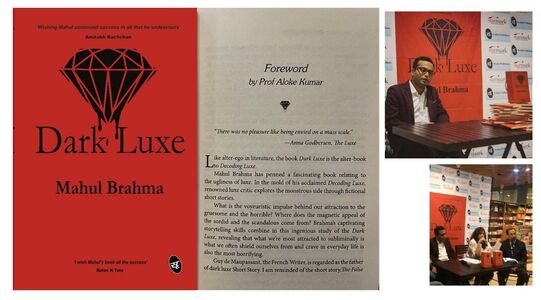"There was no pleasure like being envied on a mass scale."
—Anna Godbersen, The Luxe
Like alter-ego in literature, the book Dark Luxe is the alter-book to Decoding Luxe.
Mahul Brahma has penned a fascinating book relating to the ugliness of luxe. In the mold of his acclaimed Decoding Luxe, renowned luxe critic explores the monstrous side through fictional short stories.
What is the voyeuristic impulse behind our attraction to the gruesome and the horrible? Where does the magnetic appeal of the sordid and the scandalous come from? Brahma's captivating storytelling skills combine in this ingenious study of the Dark Luxe, revealing that what we're most attracted to subliminally is what we often shield ourselves from and crave in everyday life is also the most horrifying.
Guy de Maupassant, the French Writer, is regarded as the father of dark luxe Short Story. I am reminded of the short story, The False Gems. It tells the story of Monsieur Lantin who met a young girl at a reception at the house of the second head of his department and fell head over heels in love with her. They got married, R was unspeakably happy with her except that he found fault nth only two of her tastes: Her love for the theatre, and her taste for imitation jewellery. Her friends frequently procured for her a box at the theatre, often for the first representations of the new plays; and her husband was obliged to accompany her to these entertainments which bored him excessively after his day's work at the office. After a time, Monsieur Lantin begged his wife to request some lady of her acquaintance to accompany her, and to bring her home after the theatre. She opposed this arrangement at first, but after much persuasion, finally consented, to the infinite delight of her husband. One evening, in winter, she had been to the opera and returned home chilled through and through. The next morning, she coughed, and eight days later, she died of inflammation of the lungs. Monsieur Lantin's despair was so great that his hair became white in one month. He wept unceasingly; his heart was broken as he remembered her smile, her voice, every charm of his dead wife Time did not assuage his grief. To the last days of her life, she he continued to make purchases, bringing home new gems every evening, and he turned them over some time before finally deciding to sell the heavy necklace, which she seemed to prefer and which, he thought, ought to be worth about six or seven francs; for it was of very fine workmanship, though only imitation. He visited the Jeweler Rue de la Paix and as soon as the proprietor glanced at the necklace, he could recognize and offered Eight thousand francs. Monsieur Lantin was dumfounded.
Dark luxe knows that villains often come with pretty faces. It knows that it's the craziest thing, but people can't stop. Aft heart-stopping envy of the luxe is the sincerest form of flattery. The authors journey through the distorting mirror often leads to the death via the greed and obscene.
Dark luxe sure can be perplexing, as Brahma, the well-respected luxe intellectual, makes clear in this wonderfully provocative book. There is, at the center of the book, his short stories, which he claims as fiction, examining the widely varying concepts of the ugliness of dark luxe down through time, referencing the insights of Maharajas, Zamindars and Princes. The second level of the book is made up of lengthy quotations that provide a visual perspective to the conversation.
Another dark luxe is the faux pas of the luxe. In fact, this market is worth several times more than the brand luxe. The episode in Da Vinci Code elucidates well the point. Professor Langdon and Sophie were inside the Depository Bank of Zurich when the French Police came enquiring. The police were blocking the street. They were smuggled inside the armoured bank car and locked inside. As they were leaving:
"Must have been hours ago. I'm driving all the way up to St. Thurial tonight. Cargo keys are already up there."
The agent made no response, his eyes probing as if trying to read Vernet's mind.
A drop of sweat was preparing to slide down Vernet's nose. "You mind?" he said, wiping his nose with his sleeve and motioning to the police car blocking his way. "I'm on a tight schedule."
"Do all the drivers wear Rolexes?" the agent asked, pointing to Vernet's wrist. Vernet glanced down and saw the glistening band of his absurdly Merde. expensive watch peeking out from beneath the sleeve of his jacket.
"This Piece of shit? Bought it for twenty euro from a Taiwanese street vendor in St. Germain des Pres. I'll sell it to you for forty.
The agent paused and finally stepped aside. "No thanks. Have safe trip."
Dark Luxe, it seems, is just more interesting than Decoding Luxe. At least, that's what I think now that I've read the book. Yet, in the opening pages of the book he writes:
"When we think of luxury, we only think of dazzle, but We never even touch upon the darkness that hides behind this luxe, thanks to us - humans. It is always about glam and glitz. Behind this razzle-dazzle, there is another life. A life filled with lust, hatred, jealousy, anger.”
So, these stories are purely a work of fiction, a figment of my imagination, and by no means has any intention to paint any luxury brand in a bad light or tarnish their pristine image. It merely captures the depths to which darkness can reach in human hearts:'
The sensibility of the common speaker reveals that, whereas all the synonyms for de-luxe - distinctive, exquisite, heavenly, luxurious, opulent, savory, divine, flamboyant, ornate - could be conceived as a reaction of appreciation, almost all the synonyms for dark luxe contain a reaction of disgust, if not violent repulsion, horror, or fear.
We look at de-luxe, and we know it is a grace note of life. When we gaze on dark-luxe, we see the existence we share.
That's why, Brahma quotes:
"If you prick us, do we not bleed?
If you tickle us, do we not laugh?
If you poison us, do we not die?
And if you wrong us, shall we not revenge?
—The Merchant of Venice,
Act 3, Scene 1 by William Shakespeare
William Shakespeare may be called the "absolute acme of dark-luxe" — because he was an artist who blended de-and dark- luxe; beauty and ugliness as happens in nature, where individual beauties are never free of impurities, and both his works and his characters possess a wealth of these impurities.
I think there is a temptation to call the book 'a leer' due to its dark side. The look, the smile of the characters in the book could just as well be read as deep affection and delight. We would read it that way if he were a studly courtier, wouldn't we?
Though accompanying verbal snippets fight a losing battle with the images, this book is full of amazements.

